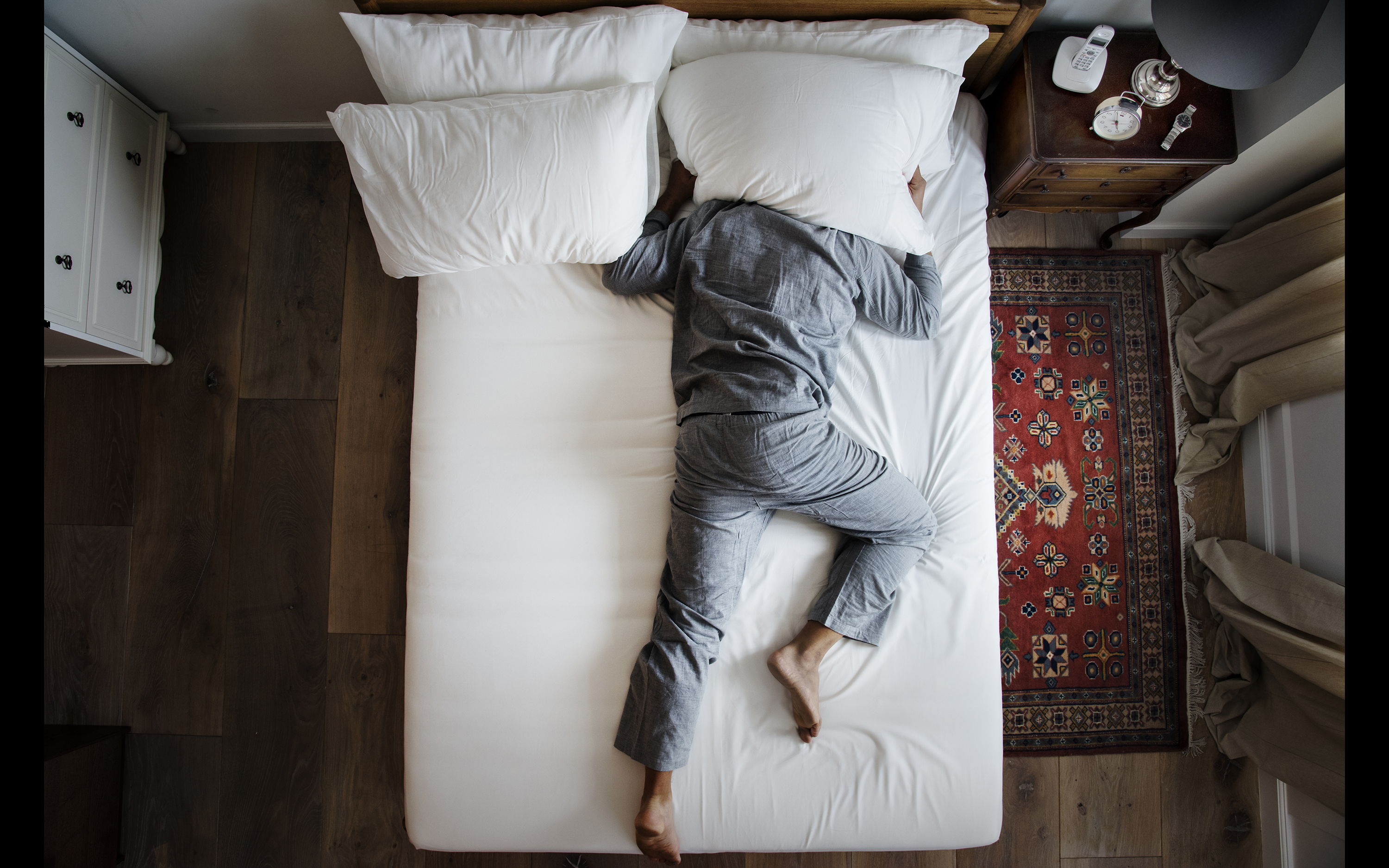
Sleep is a critical component of overall well-being. It doesn’t just heal your body; it heals your mind. Mindfulness for sleep can help you get a good night’s rest which can change how you interact with the world by elevating your mood and improving your concentration. In our fast-paced world, increased feelings of stress and anxiety can prevent people from tapping into the healing power of sleep. In fact, an estimated 30% of Americans are regularly sleep deprived.
With regular sleep deprivation, your attention span, mood, and memory suffer, according to Matthew Walker, PhD, professor of neuroscience and psychology at the University of California, Berkeley, and founder and director of the Center for Human Sleep Science. Over time, he suggests, sleeplessness could also lead to unwanted weight gain and mood problems. In up to 15% of adults, insomnia causes daytime distress or impairment, with the risk for insomnia being greater in women and older adults.
That’s where mindfulness comes in. This guide will help you practice mindfulness for sleep by introducing meditation and movement techniques based on cultivating awareness. The ability to “be with what is” holds powerful benefits for taming anxious thoughts, calming your mind, and promoting a good night’s sleep.

Why Practice Mindfulness for Sleep?
“Mindfulness can quiet the brain and allow for deeper sleep,” says Shelby Harris, PhD, a clinical sleep psychologist in private practice in White Plains, NY. One of the biggest problems her clients share is dreading the night as it comes and growing anxious about trying to make themselves get sleepy. They worry, she says, that they “won’t be able to do X, Y, Z the next day” if they don’t sleep. “That thought process makes you stressed, worrying—often unnecessarily—about the next day’s effects. That cycle worsens sleep,” says Harris.
Mindfulness can set the stage for sleep by allowing you to be more aware of your thoughts and to be able to let go of those anxieties instead of getting stuck on them, says Harris. “Strengthening your ‘mind muscle’ through daily practice helps you better recognize the negative insomnia-inducing thoughts and let them pass.”
Mindfulness meditation prepares your mind for drifting off to sleep, and it can also improve sleep quality. Studies have shown that mindfulness may be at least as effective as other highly recommended insomnia treatments.
Four Mindfulness Dos and Don’ts for a Good Night’s Sleep
Meditate daily. Maintaining a regular, daytime mindfulness meditation practice will help you sleep better and stay asleep longer at night. However, it’s not a panacea. If you’re the kind of person who wakes up at 3 am a daily mindfulness practice might not immediately change that. In this case, you might just try a body scan while in bed, to relax any tension you may be holding in your body.
Practice out of bed. If sleep still doesn’t arrive, you can do a mindfulness practice, but get out of bed and do it elsewhere. Staying awake in bed for longer than 20 minutes creates an association that the bed is for other activities as well as sleep, says Harris. The point isn’t to fall asleep in the midst of your practice, but afterward when you return to bed.
Don’t rely on those ubiquitous sleep apps. “A lot of people use them as a sedative, but that’s not ideal,” says Harris. “You shouldn’t need to rely on anything to fall asleep—what happens if one day your phone is out of juice or the app doesn’t work?”
Try not to force it. When you’re having trouble drifting off in the wee hours, try to let go of the struggle. As every insomnia sufferer knows, the more you lie there trying to make yourself sleep, the more it won’t happen. Notice your worries about being unable to sleep, your noisy mind, and visualize them floating by. The more you do this and accept that you cannot force sleep, the easier sleep will come.


Three Ways to Wind Down for Sleep with Mindfulness
Getting a solid night’s sleep starts with the way you spend your time leading up to bedtime. Elisha Goldstein, Ph.D., recommends trying these three science-backed techniques for cultivating a better attitude about sleep and preparing yourself for a good night’s rest.
1. Say goodnight to your devices: Falling asleep means eliminating distractions, and smartphones are a likely distraction culprit. Not only will a phone or tablet lighting up your bedside table disturb your sleeping patterns, but these screens also emit blue light, which affects your brain by increasing alertness and reducing levels of sleep-inducing melatonin. It’s best to give your devices a break before bedtime.
2. Don’t force it: “Fake it until you make it” applies to sleep, too. The pressure of trying to fall asleep could have an adverse effect and heighten feelings of stress. By practicing mindfulness and embracing the moment, sleep will usually come naturally.
3. Try a body scan meditation: Body scans are effective mindfulness meditations for sleep. Start by noticing sensations in your body and your breathing. When your attention wanders, see if you can just take note of that and gently center your thoughts. When we allow ourselves to be with what’s here, the body naturally goes to rest, which is what it wants to do.

How to Calm a Worried Mind: Simple Tips for Falling Asleep
Forty-three percent of Americans say stress has caused them to lie awake at night at least once a month. Modern day distractions like work and social media can prevent us from noticing our thoughts until our head hits the pillow, and these racing thoughts can easily turn into anxiety. Behavioral sleep expert Jared Minkel knows how difficult it is to quiet mental chatter. Here are his top four ways to use mindfulness to calm a worried mind and sleep more soundly.
1. Encourage positive distractions
Focusing your attention on how you can’t get to sleep will only make sleep more difficult. Instead, Minkel recommends distracting yourself with “interesting and engaging imagery,” involving as many of your senses as possible.
For example, close your eyes and picture a nice beach—can you hear the crashing of waves? Feel the sun on your skin? Taste the salt from the sea?
“These kinds of images can then transfer into dream content, so keep it pleasant and positive,” Minkel says.
2. Allow worrisome thoughts
If you’re unable to sleep because you’re fixated on something stressful that’s happening—like a big presentation at work, or a confrontation with a family member—it’s common to want to push those thoughts from your mind. However, doing so may hurt more than it helps.
Rather than trying not to think about what’s worrying you, he recommends considering what comes after the big event. Remembering the mundane tasks that follow something stressful—like cleaning up your meeting space after the presentation, or going grocery shopping after you’ve seen family—can help you recognize that the panic will pass.
“Keep going until the stressful part is over and you’re back into your normal life,” Minkel says. “Don’t just replay the worst parts over and over.”
3. Practice nightly mindfulness
Consistency is key. Mindfulness for sleep is even more effective when practicing it regularly. Soon, you’ll become a master at directing your attention toward what’s happening in the present, instead of laying awake and worrying about what that will happen in the future.
“You can always focus on your breathing, but it may also be helpful to focus on a physical sensation like how warm and soft your blankets feel,” Minkel says.
You can also try a body scan meditation to relax both your body and mind.
4. Focus on gratitude
Focusing on the good can evoke pleasant emotions and help soothe you to sleep.
“For example, rather than thinking what might go wrong, try to focus your attention on something you’re looking forward to,” Minkel says. “You can also think of something that happened during the last day or two that you are grateful for.”
It can also be comforting to think of a positive person in your life, or nice deeds other people have done for you.
“Feeling fortunate or grateful for that person can reduce worry and help you sleep,” Minkel says.

Guided Meditations, Bedtime Yoga, and Mindful Movement for Better Sleep
Intentional movement and meditation can help prepare your body and mind for restful sleep. The right practices and meditations for sleep are handy before bed or if you find yourself tossing and turning in the middle of the night.
We’ve collected our top guided meditations and movement practices for an email series specifically designed to support you in your mindfulness journey toward healthy sleep.

Morning Mindfulness Bonus: Wake Up and Start Your Day Strong
Waking up with intention is just as important as falling asleep soundly. Starting your day off right can make a huge difference in your mood for the rest of the day, ultimately affecting how you feel when your head hits the pillow again. Integrating these steps into your morning routine can support you in being more mindful, self-compassionate, connected, and resilient throughout the day:
1. Curate your first sounds: Rather than starting the day off with an alarm that makes your body tense, choose an alarm that’s gentle and soothing—chimes, bells, more relaxing music, whatever it might be. This allows your body to take in something soothing to start the day.
2. Hydrate before you caffeinate: Rather than going straight for coffee or tea, see if you can drink a big glass of water. Your body is dehydrated—your body needs water, you have not drunk water all night long. Then move to your cup of coffee or tea.
3. Observe nature: Instead of grabbing your phone or laptop, start your day by going outside and enjoying the world around you. Allow your eyes and body to take in the sky, the trees, the bugs in the grass. You’ll be able to start your day with a more rich perspective and sense of interconnectedness.
If you want a more guided experience to incorporate mindfulness into your daily routine, try this morning practice to ease into your day with more clarity and vitality.
Read more
Five Ways Sleep Is Good for Your Relationships
New research highlights how sleep benefits our social lives.
Read More
You Can’t Force Yourself to Sleep Well—Try this Sleep Meditation, Instead
Striving for sleep makes sleep more challenging. Try this guided meditation to help you settle down and drift off.
Read More
Senior Executives Get More Sleep Than Everyone Else
Rest is essential for logical reasoning, attention, and mood.
Read More






